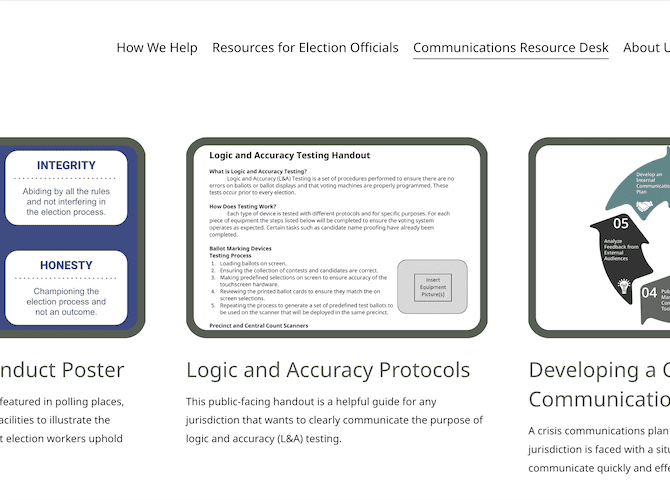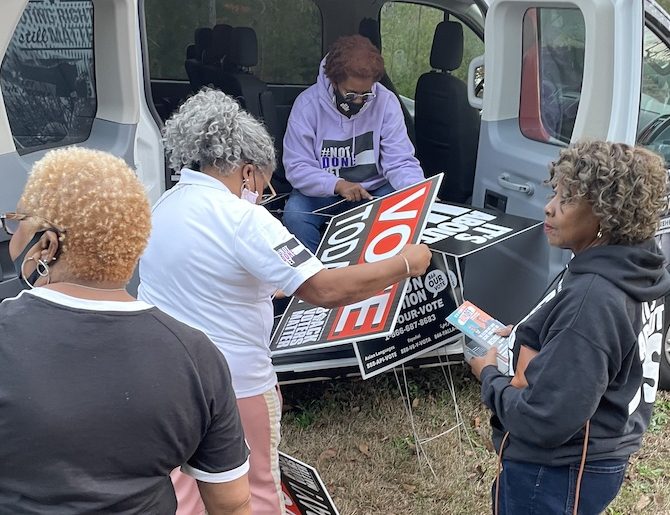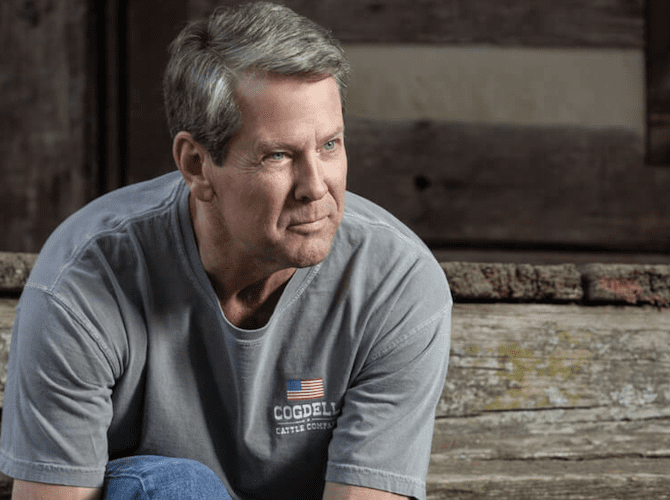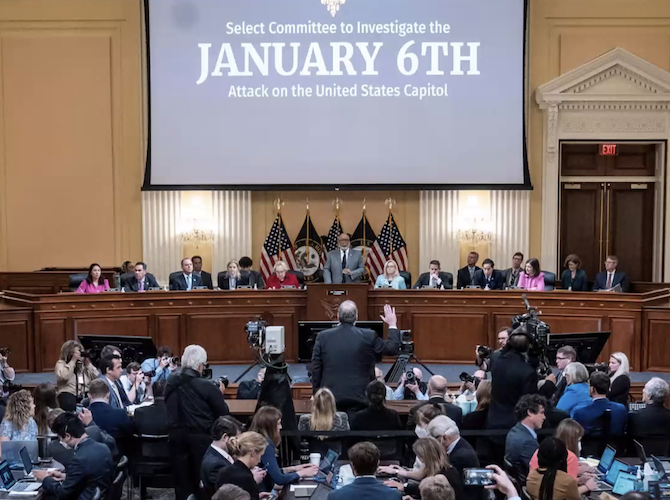In Georgia Runoff It’s Loud Visible Democrats Versus Quiet, Covert Republicans
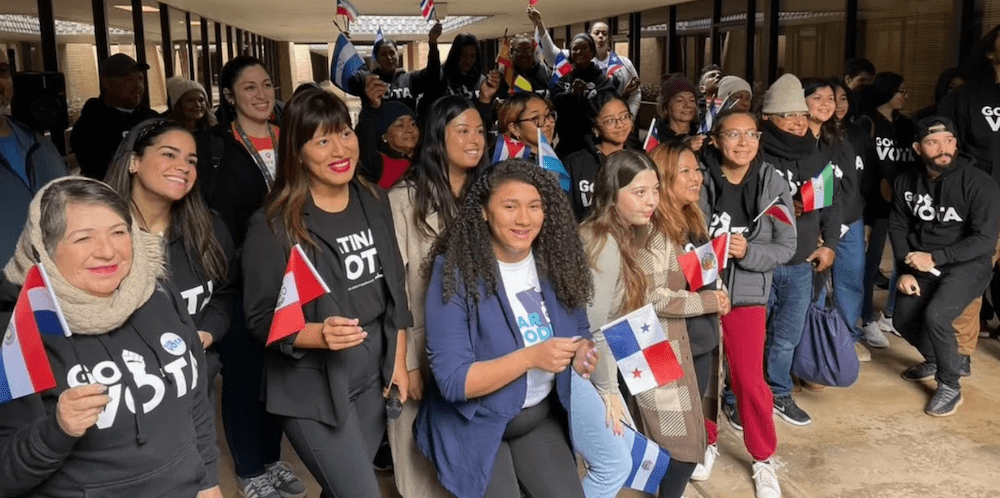
(“Latinas to the Polls” prepare for a car caravan in Norcross, Georgia, on Friday, December 2, 2022. Photo by Steven Rosenfeld)
The margins are razor thin in Georgia’s Senate runoff that ends on December 7, according to interviews with dozens of party insiders, grassroot organizers and voters at polls and rallies across the state during the past week.
Sen. Raphael Warnock, the Democratic incumbent, appeared to lead as early voting concluded on Friday – a sentiment affirmed by CNN’s latest poll that spoke to voters from Thanksgiving weekend through Tuesday. But Republicans say that their base prefers voting in person at local precincts on Election Day, fueling their hopes that a surge will elect Hershel Walker, the Georgia football legend whose Republican candidacy was propelled by Donald Trump.
As early voting closed, 1.83 million Georgians had voted in person or returned mailed-out ballots, according to the secretary of state’s office. While daily turnout broke records, including 350,000 votes cast Friday, only 26 percent of Georgians with active voter registrations have voted so far. In contrast, in 2020’s runoffs where control of the Senate was in play, about 4.5 million votes were cast.
In many respects, both parties are reverting to core values and loyalties to bring out voters. At Walker’s rallies this week, he presented himself as a man who has been redeemed by Christianity and, if elected, would oppose the “evil” policies put forth by Democrats and the Biden administration.
Such religious and party orthodoxies were well-received by his supporters, who, in interviews after the rally, mentioned that Trump’s offensive behavior did not stop the former president from enacting policies that they approved of. And, of course, Walker’s status as a football legend and “good old boy” was appealing.
“Everybody in Georgia loves Hershel. You should have seen that boy run,” said Fran, a retired furniture store owner, who declined to give her last name, but attended a Walker rally on Monday in Toccoa, in the state’s northeast corner.
Interviews with voters in Republican strongholds, such as in Hall County north of Atlanta, suggested that party loyalty – including the last-minute endorsement of Walker by Gov. Brian Kemp, the state’s top-ranking Republican, who did not back Walker in the primary election, will push party faithful to vote on Tuesday.
“I do think it will have some influence on people,” Sloane Mattadeen, who serves in the U.S. Navy, said after voting. “I think there is some authority there.”
On the other hand, Walker has an uphill climb. He received 200,000 votes less than Kemp in the general election and was 38,000 votes behind Warnock out of nearly 4 million votes cast statewide. What makes Democrats nervous is that Walker’s campaign has been eerily quiet in all but the state’s remote regions.
“They ran a quiet, very covert campaign this entire midterm,” said a Democratic congressional staffer who asked not to be named. “You didn’t see Kemp. If it was not for Donald Trump and his big mouth, you may not even know what was going on with Herschel Walker. You don’t see them when they come for fundraisers… The Republicans are making phone calls, but it is not overt at all.”
The GOP’s latest lawn signs do not mention Walker’s name; they just urge people to vote Republican. Typically, one usually sees one or two lawn signs for Walker, which contrasts with a half-dozen or more signs for Warnock on busy streets.
A former state government press aide who recently took a private sector job said that many of Georgia’s Republican leaders are tired of all-things Trump, including his hand-picked candidates like Walker. That partly accounts for the lower-profile messaging, he said, adding that the GOP base understands Kemp’s signals.
Whether that comment applies equally to men and women is another variable. As of Friday morning, about 10 percent more women had voted compared to men, the state reported. (Academics said that split was normal in Georgia elections.)
Walker’s anti-abortion stance, despite previously paying for abortions and of domestic abuse, both of which Democrats have publicized, was downplayed by several women who said they had just voted for Walker. Other voters, women and men who said they were voting for Warnock, said that Walker’s character was deeply flawed. Black voters went further and said that his candidacy was perpetuating ugly stereotypes about Black men that they have worked for years to overcome.
More Visible Democrats
In contrast, the Warnock campaign and many get-out-the-vote efforts by various constituencies who are likely to support him have been highly visible and vocal. Groups that barely existed a few years ago have been conducting voter drives as part of longer-term efforts to empower their communities.
In a warehouse district north of Atlanta on Friday, three dozen volunteers – mostly young women wearing black sweatshirts saying “Go VOTA” – assembled for a car caravan through nearby neighborhoods to urge Latina women to vote. They also planned to knock on 1,000 doors. Organizers from seven groups behind this effort said they already had made more than 90,000 phone calls to voters.
There are grassroot efforts like this across the state. By Friday morning, more than 800,000 white voters had cast ballots, 477,000 Black voters had cast ballots and 24,000 Hispanic voters had cast ballots, the state data hub reported. While the Hispanic numbers were low compared to other groups, this voter drive’s organizers said their voters could make a difference if margins were close.
“I was born in Georgia and raised in Gwinnett County, a lovely multicultural, multi-lingual community,” said Leslie Palomino, senior canvass lead for Georgia at PoderLatinx. “Growing up in a mixed-status family led me, the middle child in a household of five, to become the first eligible voter. Today, I’ll be casting my vote alongside my sister, Kimberly Palomino. Latinas are a powerful force and today we make our voice heard.” A few minutes later, Palomino and a caravan of flag-waving, horn-honking volunteers left to visit one early voting site and then rouse voters. There was no comparable canvass and visibility effort from Republicans in sight.



